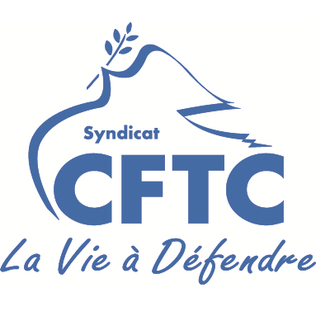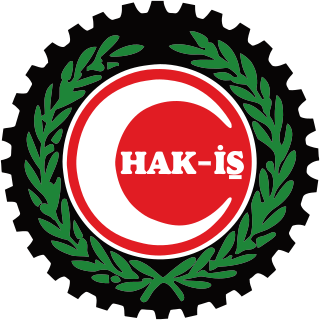
The World Federation of Trade Unions (WFTU) is an international federation of trade unions established on October 3, 1945. Founded in the immediate aftermath of World War Two, the organization built on the pre-war legacy of the International Federation of Trade Unions as a single structure for trade unions world-wide, following the World Trade Union Conference in London, United Kingdom.

The French Confederation of Christian Workers is one of the five major French confederation of trade unions, belonging to the social Christian tradition.

The Norwegian Confederation of Trade Unions is a national trade union center, decidedly the largest and probably the most influential umbrella organization of labour unions in Norway. The 21 national unions affiliated to the LO have almost 1,000,000 members of a Norwegian population of 5 million. The majority of affiliated unions organizes traditional blue collar workers, but the largest affiliate is the Norwegian Union of Municipal and General Employees which makes up more than a third of all members. LO is affiliated to the ITUC and the ETUC.
Organizers within trade unions have sought to increase the bargaining power of workers in regards to collective bargaining by acting in concert with other trade unions. Multi-union organizing can take place on an informal basis, or on a more formal basis via an umbrella organization comprising multiple trade unions. Such umbrella organizations may be referred to as a trade union federation, trade union confederation, or a trade union centre.

The World Confederation of Labour (WCL) was an international labour organization founded in 1920 and based in Europe. Fascist governments of the 1930s repressed the federation and imprisoned many of its leaders, limiting operations until the end of World War II. In 2006 it became part of the International Trade Union Confederation (ITUC), ending its existence as an independent organization.
The Cyprus Workers' Confederation (SEK) is a trade union centre in Cyprus. It is affiliated with the International Trade Union Confederation, and the European Trade Union Confederation.
The Revolutionary Trade Unions Federation (DEV-İŞ) is a trade union centre in Cyprus. It is affiliated with the World Federation of Trade Unions. The organization traces its origins to 1975, when workers founded several trade unions that form the basis of the DEV-İŞ confederation.
Dieter Schulte was a German trade union leader. He was chairman of the German Confederation of Trade Unions (DGB) from 1994 to 2002.

The Taiwan Confederation of Trade Unions is a national trade union center in Taiwan. It was established in 1997, but did not receive official recognition from the government until May 1, 2000.

The Tunisian General Labour Union is a national trade union center in Tunisia. It has a membership of more than one million and was founded January 20, 1946.

The Confederation of Turkish Real Trade Unions (HAK-İŞ) is one of the four major national trade union centers in Turkey. It was founded October 22, 1976, and has a membership of 680,000. It was established as a confederation of trade unions close to Islamist National Salvation Party.

The International Trade Union Confederation (ITUC) is the world's largest trade union federation.
Trade unions in Albania have had an unstable existence in recent decades, mirroring the regional political turbulence in Albania. Since the 1991 defeat of the Albanian Party of Labour (APL), independent trade unions have asserted themselves, with two main national trade union centres; the United Independent Albanian Trade Unions (BSPSh) and the Confederation of Trade Unions (KSSh).
The Confederation of Free Trade Unions of India is a trade union confederation in India. N. Kanaka Rao is the general secretary of CFTUI. CFTUI became a full member of the World Confederation of Labour in 1999. In 2003 the then CFTUI president Ashok Kumar Trivedi was assassinated.
Trade unions in Cyprus include:
The Pancyprian Organization of Independent Trade Unions was a trade union centre in Cyprus. PAOS was founded in 1956, by unions that wanted to position themselves as independent from political parties. The organization reached its peak of influence in the late 1950s. Starting from the early 1960s the organization entered a prolonged period of decline. By 1990, the organization had only 500 members. POAS was affiliated to the World Confederation of Labour.
The Federation of Turkish Cypriot Trade Unions (TURK-SEN) is a federation of 9 trade unions in Cyprus. It is affiliated with the International Trade Union Confederation, and the European Trade Union Confederation.
Trade unions in Norway first emerged with the efforts of Marcus Thrane and the formation of the Drammen Labour Union in 1848 which organised agricultural workers and crofters. However, with Thrane's imprisonment and the suppression of the union in 1855, it was not until 1872 before a union was founded again, by print workers. In 1899 the first national federation, the LO, was founded. During this period interactions with trade unions in Denmark and Sweden played a great influence over the development of trade unions in Norway.








